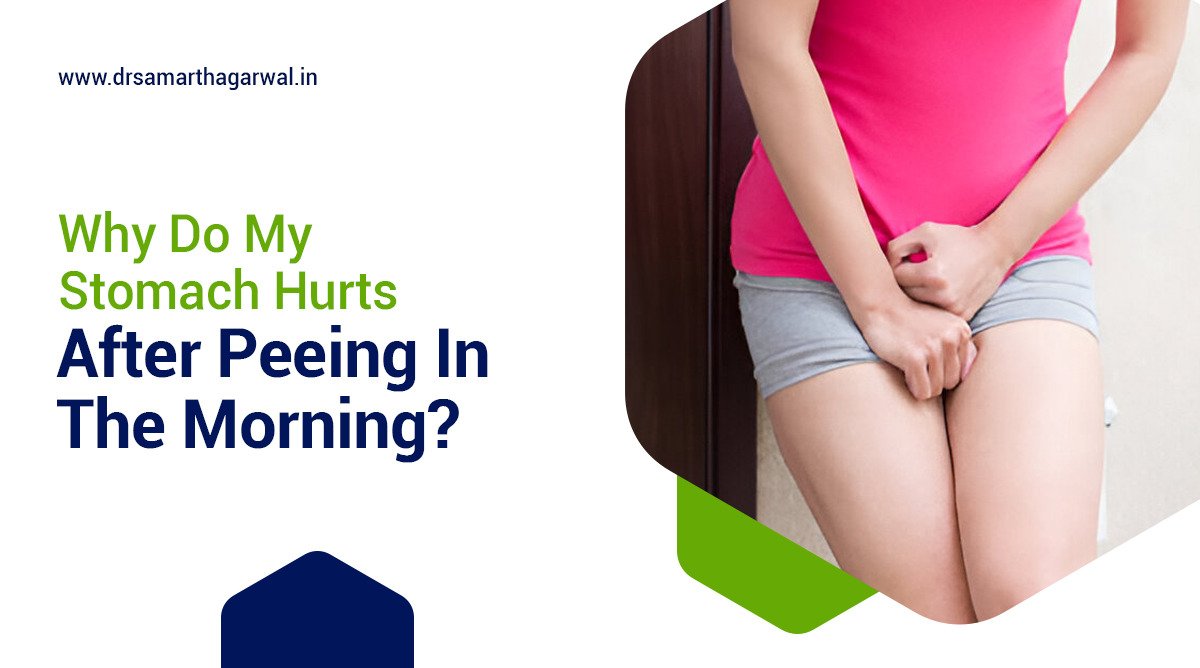Experiencing stomach pain after urination can be distressing and may signal an underlying health issue. Various potential causes, including urinary tract infections and kidney stones, can contribute to this discomfort. This article examines these causes in detail, discusses associated symptoms such as painful urination and urgency, and emphasizes the importance of seeking medical attention when necessary. Additionally, it offers effective treatment options and preventive measures to help manage and alleviate symptoms.
Possible Causes of Stomach Pain After Urination
Experiencing stomach pain after urination, particularly in the morning, can be concerning and may result from various underlying conditions. This pain, whether mild or severe, can signal numerous issues ranging from urinary tract infections (UTIs) to kidney stones, and even more serious conditions like inflammatory bowel disease (IBD), as noted by experts Elizabeth Pratt and Dr. Robert Burakoff.
Understanding the potential causes of abdominal pain is crucial for accurate diagnosis and effective treatment. Stomach pain following urination may be linked to infections and other medical issues that require intervention, making it essential to thoroughly explore each possible cause.
Urinary Tract Infection (UTI)
A urinary tract infection (UTI) is one of the most common causes of abdominal pain during urination, particularly in the morning, as it can irritate the bladder and surrounding tissues. This irritation often leads to additional uncomfortable symptoms, such as nausea and vomiting, making the experience very unpleasant for those affected.
UTIs typically occur when bacteria enter the urinary system, resulting in a wide range of symptoms, including a frequent urge to urinate and a burning sensation during urination. Bladder infections, a common type of UTI, may be well-known, but many people are unaware of their potential severity if left untreated.
Medical professionals often rely on urine tests and imaging studies to make an accurate diagnosis. Fortunately, UTIs can usually be treated quickly with antibiotics, which is why it is important to seek medical attention early to avoid complications.
Bladder Infection
A bladder infection is a type of urinary tract infection (UTI) that affects the urinary bladder and can cause symptoms such as stomach pain, frequent urination, and an urgent need to urinate.
This infection occurs when bacteria enter the bladder, typically through the urethra, triggering an inflammatory response. Factors such as poor hygiene, urinary retention, and sexual activity can increase the risk of developing an infection.
Individuals may experience not only acute pain in the lower abdomen but also feelings of pressure or cramping. It is important to recognize that bladder infections can exacerbate pre-existing urinary issues, such as incontinence or urgency, creating a harmful cycle.
Addressing bladder issues is crucial, as untreated infections can lead to more severe complications, including kidney infections.
Kidney Stones
Kidney stones are hard mineral deposits that can form in the kidneys, leading to severe abdominal pain, especially during urination when the stones move through the urinary tract.
These stones can vary in size, ranging from tiny grains to larger formations that may block the flow of urine, resulting in intense discomfort.
When they pass into the ureter or bladder, they can trigger a variety of symptoms, including sharp abdominal pain, often accompanied by nausea and vomiting. This bodily response occurs as the body attempts to expel the stone, which can place significant strain on the digestive system as well.
Understanding the formation of kidney stones, which can arise from factors such as dehydration or high oxalate intake, is essential for recognizing their connection to digestive health.
Prostate Issues
Prostate issues can lead to abdominal pain, particularly in men, and may result in urinary difficulties and complications if not properly managed.
Some of the most common prostate-related medical conditions affecting male health are benign prostatic hyperplasia (BPH) and prostatitis.
BPH is characterized by the enlargement of the prostate gland, which can exert pressure on the urethra, leading to increased frequency of urination, weak urine flow, and straining during urination.
Prostatitis, an inflammation of the prostate, may cause pelvic pain, painful urination, and even fever.
Both conditions can significantly diminish quality of life, making it essential for men to seek medical attention if they experience any symptoms.
Gynecological Issues
Gynecological issues can significantly contribute to abdominal pain experienced by women after urination. Conditions such as ovarian cysts and endometriosis can lead to discomfort during urination by exerting pressure on surrounding organs and tissues.
Ovarian cysts may cause pain by distorting normal anatomical structures, while endometriosis can result in chronic pelvic pain, often exacerbated during or after urination.
Additionally, related gastrointestinal disorders, such as irritable bowel syndrome (IBS) and inflammatory bowel disease (IBD), complicate the clinical picture. The overlapping symptoms of these conditions can create a cycle of pain, as discomfort from gynecological issues may feel similar to or worsen sensations associated with IBS or IBD.
This complexity makes it more challenging for healthcare providers to accurately diagnose and effectively treat the underlying problems.
Other Associated Symptoms
Stomach pain after urination is often accompanied by several related symptoms that can help identify the underlying cause. Important contributing symptoms include:
- Painful urination
- Increased frequency and urgency of urination
- The presence of blood in the urine
When these symptoms occur alongside abdominal pain, nausea, and vomiting, they can assist healthcare providers in diagnosing conditions such as urinary tract infections (UTIs), bladder infections, or more serious medical issues.
Painful Urination
Painful urination, known as dysuria, is a common symptom of urinary tract infections (UTIs) that can lead to abdominal pain and discomfort. Dysuria typically indicates the presence of an infection within the urinary tract, resulting in inflammation and irritation.
During this condition, the infected individual often experiences a frequent urge to urinate, which can exacerbate the pain and contribute to a sensation of fullness or pressure in the abdomen. As the infection progresses, the spreading inflammation may cause discomfort throughout the abdominal area, leading to feelings of nausea or unease.
While frequent and painful urination strongly suggests a possible UTI or other underlying infections, the symptoms can be effectively treated to alleviate both urinary pain and any associated abdominal discomfort.
Frequency and Urgency
Increased urinary frequency and urgency are significant symptoms that may occur alongside abdominal pain, potentially indicating underlying conditions such as urinary tract infections (UTIs) or bladder infections. Individuals experiencing these symptoms in conjunction with abdominal pain often feel concerned and seek medical evaluation.
The connection between the bladder and various abdominal organs means that abnormalities related to the kidneys, such as kidney stones, or even appendicitis could also be responsible for the presence and urgency of these symptoms.
Additionally, inflammation or irritation in the urinary tract, whether due to infections or other pathological conditions, may contribute to these symptoms. Properly recognizing these warning signs is crucial, as it can lead to appropriate diagnoses and treatment plans, emphasizing the importance of being attentive to the signals one’s body provides.
Blood in Urine
Blood in urine, known as hematuria, is a concerning symptom often accompanied by severe abdominal pain, and it requires immediate medical evaluation.
This alarming symptom can be caused by a variety of medical issues, ranging from urinary tract infections and kidney stones to more serious conditions such as tumors or glomerulonephritis.
Individuals with hematuria frequently report pain or cramping in the abdomen, making it crucial to be aware of the potential underlying causes.
Prompt medical intervention is essential, as it can lead to earlier diagnoses that are more treatable and may help prevent serious complications.
Additionally, any changes in the color or consistency of urine should be noted, as they may indicate serious underlying medical conditions that necessitate evaluation by a healthcare professional.
When to Seek Medical Attention
Persistent or severe stomach pain following urination—especially when accompanied by vomiting, fever, or changes in bowel habits—may signal serious issues like appendicitis or colon cancer. If you experience these symptoms, seek hospital care immediately. Dr. Samarth Agarwal recommends prompt evaluation to ensure timely diagnosis and treatment.
Treatment and Prevention
Stomach pain after urination can be treated and prevented with appropriate medical and home remedies, depending on the underlying cause.
Medical and Home Remedies
Medical remedies for stomach pain after urination typically involve antibiotics to treat urinary tract infections (UTIs), while home remedies offer relief through natural methods such as hydration and herbal teas.
Along with antibiotics targeting the bacterial infection causing the UTI, over-the-counter medications like ibuprofen can help alleviate pain and discomfort associated with abdominal cramps.
Individuals may explore various home remedies, including:
- Drinking plenty of water to help flush out bacteria.
- Consuming cranberry juice, which is known for its ability to help prevent further infections.
- Using herbal options such as chamomile and peppermint tea, which may soothe the digestive tract and reduce inflammation.
It is important for individuals to recognize the symptoms they are experiencing and consider consulting a healthcare professional for a personalized treatment plan.
Preventive Measures
You can reduce the risk of experiencing stomach pain after urination by staying adequately hydrated, practicing good hygiene, and being mindful of bladder health.
Proper hydration supports all bodily functions and dilutes urine, which helps to minimize irritation in the urinary tract. It is important to drink enough water throughout the day while limiting the intake of caffeine and alcoholic beverages, as these can act as irritants.
Engaging in regular physical exercise helps maintain a healthy body weight and promotes cardiovascular health, both of which are essential for improving gastrointestinal health and preventing urinary-related issues.
Additionally, reducing the consumption of spicy or acidic foods, scheduling regular medical check-ups, and employing stress-reduction techniques can further aid in preventing potential problems and maintaining stomach health.

Contact Dr. Samarth Agarwal if you have any questions or concerns about your Urinary health!




